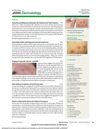 10 citations,
May 2013 in “Actas Dermo-Sifiliográficas”
10 citations,
May 2013 in “Actas Dermo-Sifiliográficas” Most white Spanish women have a widow's peak, and their hairline measurements could help in hair restoration surgery.
 March 2017 in “Iraqi Journal of Pharmaceutical Sciences”
March 2017 in “Iraqi Journal of Pharmaceutical Sciences” Abuse of anabolic steroids in Iraqi athletes leads to negative effects on hormones, liver and kidney function, blood sugar, and cholesterol levels.
 28 citations,
January 2003 in “Urologic oncology”
28 citations,
January 2003 in “Urologic oncology” Suppressing certain hormones might help prevent prostate cancer.
 5 citations,
December 2021 in “Physiological Research”
5 citations,
December 2021 in “Physiological Research” Men, particularly those with hair loss, are more likely to get the virus, and those with prostate cancer may have milder symptoms. Testosterone's role in the disease is unclear, and the virus doesn't seem to harm male fertility. Women with PCOS might be at higher risk. More research is needed.
19 citations,
June 2021 in “The world journal of men's health” Using anabolic-androgenic steroids can harm men's reproductive health and increase the risk of heart problems and death.
 5 citations,
January 2021 in “Biomedicine & Pharmacotherapy”
5 citations,
January 2021 in “Biomedicine & Pharmacotherapy” Policosanol helps treat hair loss by balancing hormones and supporting hair growth.
 64 citations,
August 2019 in “Circulation”
64 citations,
August 2019 in “Circulation” ADT, especially enzalutamide, may increase the risk of heart rhythm problems and sudden death in men.
 77 citations,
March 2001 in “Clinics in Dermatology”
77 citations,
March 2001 in “Clinics in Dermatology” Androgenetic alopecia involves genetics, hormones, and can be treated with medications or surgery.
 September 2016 in “Gynecology Obstetrics and Reproductive Medicine”
September 2016 in “Gynecology Obstetrics and Reproductive Medicine” Effective treatment for skin issues in women with PCOS includes oral contraceptives, antiandrogens, and other medications and procedures.
 2 citations,
January 2023 in “BioMed Research International”
2 citations,
January 2023 in “BioMed Research International” The secretome from mesenchymal stromal cells shows promise for improving facial nerve injury treatment.
 October 2023 in “Recent Trends in Pharmaceutical Sciences and Research”
October 2023 in “Recent Trends in Pharmaceutical Sciences and Research” The paper concludes that animal models help in understanding hair loss causes and developing new treatments.
 September 2023 in “International Journal of Community Medicine and Public Health”
September 2023 in “International Journal of Community Medicine and Public Health” Different sebaceous gland diseases can be treated with medications, hormone therapy, or surgical methods.
 2 citations,
October 2021 in “Exploration of targeted anti-tumor therapy”
2 citations,
October 2021 in “Exploration of targeted anti-tumor therapy” Breast cancer hormone therapy can cause hair loss, which can be treated with daily applications of specific topical solutions like minoxidil and hydrocortisone butyrate.
 1 citations,
May 2023 in “Frontiers in Endocrinology”
1 citations,
May 2023 in “Frontiers in Endocrinology” Autism's genetics are linked with early age of puberty and less hair loss, but not with hormone levels or polycystic ovary syndrome.
 January 2025 in “Applied Sciences”
January 2025 in “Applied Sciences” Sulforaphane from broccoli may help treat certain cancers, hormone issues, and hair loss.
 1 citations,
January 2018 in “Journal of Gynecologic Surgery”
1 citations,
January 2018 in “Journal of Gynecologic Surgery” Removing both ovaries can treat increased testosterone and related symptoms in postmenopausal women with ovarian hyperthecosis.
 April 2023 in “Elsevier eBooks”
April 2023 in “Elsevier eBooks” PCOS is a common and costly condition in North American women, causing various health issues like obesity, diabetes, and fertility problems.
 5 citations,
September 2021 in “Dermatology Reports”
5 citations,
September 2021 in “Dermatology Reports” Skin problems like acne and excess hair in PCOS are common and linked to being overweight.
 1 citations,
March 2021 in “Skin health and disease”
1 citations,
March 2021 in “Skin health and disease” Better hair loss models needed for research.
 January 2022 in “Springer eBooks”
January 2022 in “Springer eBooks” The book explains causes and treatments for common hair loss, its psychological effects, related health risks, and emphasizes early screening and lifestyle changes.
 September 2016 in “JAMA Dermatology”
September 2016 in “JAMA Dermatology” Melanoma patients can learn to check their skin, early balding in men may indicate similar risks as PCOS in women, certain criteria can help predict skin cancer behavior, small skin cancer may not need extra therapy after surgery, and sterile gloves don't reduce infection in minor surgeries.
January 2016 in “Dermatology Online Journal” Hormonal therapy changes skin and hair in transgender patients, who need better researched dermatologic care.
 1 citations,
November 2008 in “Gerontology”
1 citations,
November 2008 in “Gerontology” Older adults use lifestyle drugs to improve life quality and appearance, but caution is needed due to side effects and potential abuse.
 39 citations,
April 2001 in “Journal of The American Academy of Dermatology”
39 citations,
April 2001 in “Journal of The American Academy of Dermatology” Latanoprost, a glaucoma medication, caused excessive eyelid hair growth in many patients.
 1 citations,
September 2013 in “Fertility and Sterility”
1 citations,
September 2013 in “Fertility and Sterility” Finasteride discontinuation increases sperm count in men.
 116 citations,
December 2013 in “The Journal of Pediatrics”
116 citations,
December 2013 in “The Journal of Pediatrics” Most youth with gender dysphoria received hormones, had minor complications, and showed a decrease in suicide attempts after treatment.
 36 citations,
May 2011 in “The Journal of Clinical Endocrinology & Metabolism”
36 citations,
May 2011 in “The Journal of Clinical Endocrinology & Metabolism” Treatment with a hormone agonist can reduce excess male hormones in postmenopausal women without surgery.
1 citations,
March 2005 in “SKINmed/Skinmed” Oral contraceptives can help treat skin issues like acne and excess hair.
 September 2005 in “Morecambe Bay medical journal”
September 2005 in “Morecambe Bay medical journal” Insulin resistance plays a key role in PCOS, and lifestyle changes, weight loss, and medications like metformin can help manage it.
 25 citations,
May 2021 in “Journal of exposure science & environmental epidemiology/Journal of exposure science and environmental epidemiology”
25 citations,
May 2021 in “Journal of exposure science & environmental epidemiology/Journal of exposure science and environmental epidemiology” Common Black hair care products may affect hormone levels and potentially impact health, especially in reproductive and metabolic areas.



























